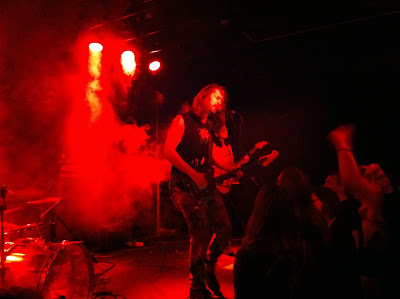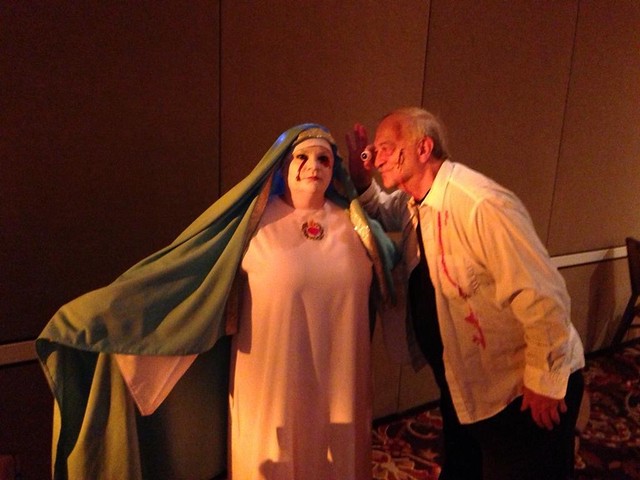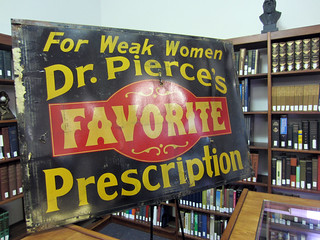 DC is a longtime contributor to the MCB.
DC is a longtime contributor to the MCB.
She can be reached at DC.in.Detroit [at] gmail.com
Buffalo/Amherst, New York
Border guard: Where are you headed?
Me: Buffalo.
Guard: What’s in Buffalo?
Me: Weekend conference, science and philosophy talks. Things like that.
Guard: And what do you do for a living?
Me: Er, I’m a graphic designer…
Didn’t occur to me how odd that could sound until that moment, that a graphic designer from Detroit would be driving across Canada to listen to people talk about climate change and living without religion.
 |
| Nooooooo no no no, uh-uh. (Ambassador Bridge) |
I got some good heckling on the Canadian side, too, when I stopped at Duty Free before crossing over to New York. Caught scanning the shelves for anything I can’t get back home (even though there’s a Duty Free within sight of my office), the lovely older Canadian sales lady asked me where I was headed. “Buffalo? From Detroit? Well, at least you aren’t going some place worse.” Double heckle from the Canadian! Well done, socialist.
It’s an easy drive from Detroit to Buffalo, through Canada (it’s faster and the roads are better), unless you don’t like bridges. I crossed over at least 5 major bridges before the day was done, but then terrifying bodies of water is kind of a theme of that area.
I had decided to go out Thursday in order to make the opening night reception. As I tend to do, I warned people about my attendance.
For once, it actually paid off, as a young man who had also been using the con hashtag approached me and said, “Hey, are you DC in Detroit on Twitter?”
Eric Wojciechowski (Wojo if you’re nasty), it turns out, is from Livonia. It was his first such con, although he’s been writing and getting involved in things atheism/humanism for a while now. And who else did I run into at the reception? A gaggle of Michiganders, of course, mostly from Grand Rapids, where
CFI Michigan is HQed.
In the opening remarks, we were told that the conference sold out, which brought us in at just under 300 people. This is a great size in my experience—enough people to justify dual tracks (“humanism” and “skepticism”) yet few enough to get to talk to plenty of people without feeling overwhelmed.
On seeing my name tag—
and I brought my own badge holder, lest my nerd cred ever be questioned—which listed me as a journalist from
MOTORCITYBLOG.net, someone asked, “So all you gotta do is say you write for a blog and you get in free, huh?” Yep, just say you write for a blog, post daily for ten years, get a few million hits, win some awards or whatever, and then you can get in to things. Sometimes.
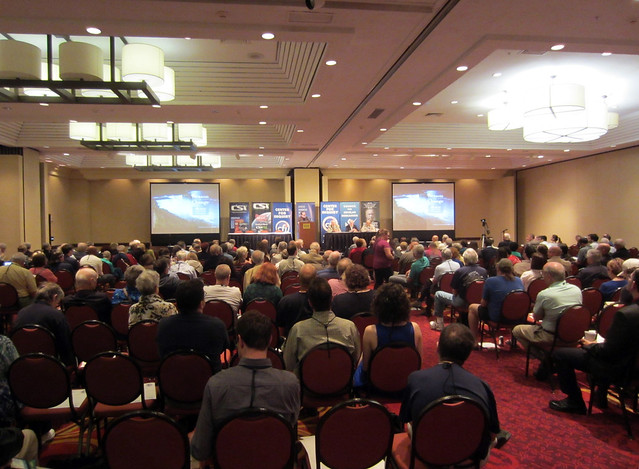 |
| The big room. |
CSI focuses on the science and skepticism side of popular nonsense (such as “alternative” medicines and climate change denial), while the Council for Secular Humanism’s aims involve human rights, and a secular, free society. Both groups have their flagship publications—the Council for Secular Humanism’s
Free Inquiry and CSI’s
Skeptical Inquirer—which have stood the test of time. If humanism and/or skepticism interest you at all, you owe it to yourself to invest in these mags.
After lunch, the tracks diverged, forcing people to make some choices: Skepticism track or humanism track? The first showdown of the day was “Why People Fall for Dubious Claims: The Lessons From a Life of Skepticism” by
Ray Hyman vs. “The Impact of the
Religious Freedom Restoration Act (RFRA)” from Nicholas J. Little. RFRA is a very current and important discussion we should all be having, but I confess to a giant soft spot for Ray Hyman, and I’d sit and listen to him tell stories all day, any day. Counting himself as a “skeptic” for 80 years (!!), Hyman didn’t disappoint.
Before Hyman begins, I can hear big-S Skeptic legend Joe Nickell holding forth at the back of the room. Joe Nickell is always holding forth.
The last talks of the day were the Alternative Medicine Panel and the Leaving Religion Panel. Once again I found myself in the room with the skeptics, as I’ve never had any religion to leave. In both this session and the earlier, it appeared to me that the attendees were split evenly between the two tracks.
As a member of the media, I didn’t technically have access to Friday night’s awards banquet, but as a member of the Michigan crew, I felt it was my duty to find a way to attend. Our own
Jeremy Beahan and
Luke Galen (also of the
Reasonable Doubts podcast) were slated to co-receive a
Forkosch Award for their article on the prosociality of religion; in other words, does religion make us better people? It’s a fascinating topic, and subject of much study. You can
read it for yourself here, or listen to Dr. Professor Luke Galen
lecturing on the topic here. Our new friend Eric had bought a ticket to the banquet, and along with Jeremy and Luke, we wanted to sit with
Jennifer Beahan and
Jefferson Seaver of
CFI Michigan, so the six of us found an empty table near the back. Shortly after settling in, we were asked to move…to a reserved table up front. Here I thought I was getting the bum’s rush! But no, we joined the jovial
Tom Flynn, editor of
Free Inquiry, and the evening’s comedian,
Leighann Lord, up in the good seats.
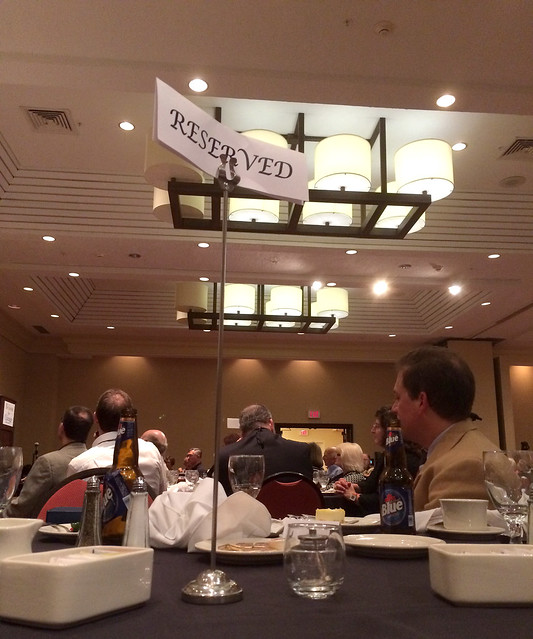 |
"I must be in the front rooowwww!"
Good lord, how old is that reference? |
If you’re reading this piece at all, you’re probably already aware of the work of Richard Dawkins. In addition to his tireless promotion of science to the general public, his 2006 smash hit
The God Delusion was instrumental in the popularization of the so-called New Atheism movement, positioning him as of one of the
Four Horsemen of New Atheism, alongside fellow authors
Sam Harris,
Daniel Dennett, and the late
Christopher Hitchens (a personal favorite of mine). His acceptance was brief, as was Jacoby’s, as she would be the evening’s featured speaker.
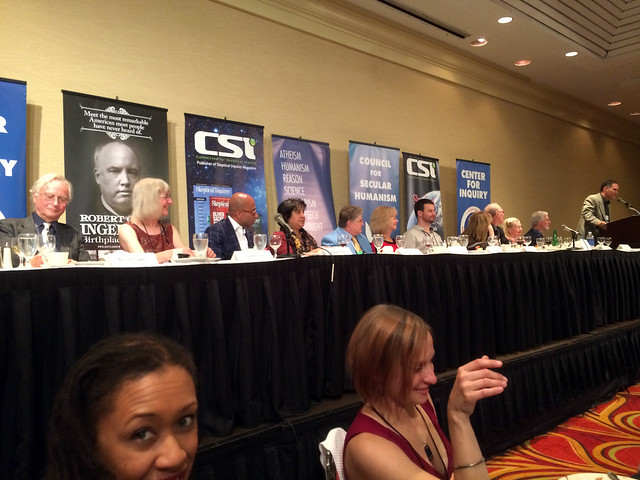 |
| Our table for the banquet, featuring Jen Beahan laughing at something pithy, and Leighann Lord wondering if I was going to be taking pictures of the top of her head all night. |
Jacoby’s Friday night talk was called “The Conscience of an Atheist.” She made a point of emphasizing that article, saying this was not the conscience of atheism or of the atheist, but instead, was a very personal speech about free will, mortality, and love. “Love is never wasted,” she read from a letter she wrote to her dying partner. “Love is never wasted, even though it is not eternal,” she told us. And we all cried.
Saturday, I awoke early and well-rested. I always sleep well in hotels, maybe the scent of bleach soothes me. I had breakfast in, again, knowing I’d need my brain spun up to speed as quickly as possible for the day’s talks. My room service waitress was the same one from yesterday, and she was chatty. When I told her I was from Detroit, she warmly thanked me for Detroit taking Buffalo in after the big snowstorm this past winter forced them to play at Ford Field. I have no memory of this whatsoever: whenever the word “football” is spoken, my brain immediately starts doing math or naming colors, anything but listening. But she was quite moved, so I played along. I’ve always said we’re pretty nice here in Detroit.
Typically, Saturday is when a con really picks up, and when I went down to the big room for the morning’s first talk, I found it mostly full. Apparently, I ask if a seat is empty wrong. I tend to ask “may I sit here?” And people panic and answer “yes, it’s taken.” It’s extra awkward. I bet if I ask “is this seat taken?” next time, they'll answer “yes, go ahead.”
The morning panels were a mix of humanism and skepticism, where I learned that the numbers are growing within
Secular Student Alliances, and that we are not hybrids with aliens, but with Neanderthals. Both good things to know.
Saturday was also the day things got more serious. Just before lunch, emcee
James Underdown told us to make sure our conference name tags were visible, as there would be an event that afternoon that would require some added security. It was at that moment that the police presence became noticeable to me. Oh, they’d been there the whole time, I just hadn’t given it much thought. It isn’t uncommon for gatherings of a couple hundred people to have some extra cops and an ambulance or two on standby—what’s unusual is for the police to be wearing flak jackets. Police or security are common even for the most benign of gatherings. And to me, this was a pretty benign gathering; there was nothing specifically blasphemous about it. But that's not how unreasonable fanatics work. Not only are there factions who take simply having a discussion about living without religion as a direct attack on them, there are plenty of places in this world where, today, saying the words “I don’t believe there is a god” can lead to being pulled out of your home and thrown into prison. And that’s just one of the
legal threats.
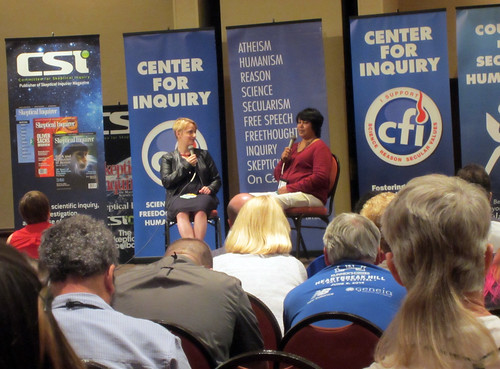 |
Lindsay Beyerstein (left) interviews Taslima Nasreen, one of the guests requiring additional security for her protection.
(Note also the magnificent rat tail at lower right.) |
There were
at least three people speaking at this event who were under current, credible death threats. Many more of them are regularly threatened, but usually by a random crank or two, not an entire country. This is the case with speakers
Taslima Nasreen and
Asif Mohiuddin, both of whom are in the U.S. under threat of imprisonment or death for the crime of speech, both of whom are under the protection of CFI.
Nasreen has been self-exiled from her home country of Bangladesh since the 1990s, when she came under threat for her writings about the humanity of women. Mohiuddin has fled Bangladesh after being viciously physically assaulted and imprisoned multiple times for similarly daring to criticize anti-humanist portions of Islam.
People are being attacked, arrested, jailed, and murdered for speaking, writing, and blogging “anti-religious” content. These aren’t theoretical laws about things people think are bad ideas (like adultery statutes here). This isn’t being yelled at on TV or people being mean on twitter. These are people being dragged from their homes and offices and stabbed to death in the street. And when they plead for help from the police, the police assist the attackers. If you are lucky, you can receive 10 years in prison for “blasphemous writing.”
As I sit here in my over-climate-controlled office overlooking the Detroit River, typing whatever I bloody well want, it chills my blood.
This isn’t just stuff happening “over there.” As our world becomes more open, it becomes smaller, and there IS no more “over there.” Nasreen and Mohiuddin are death-defying heroes in their home countries for doing what we do every day here in the States—or what we presume to continue to do. As insidious influences grow, and well-meaning people bend over backward to accommodate those horrible ideas in the name of diversity and acceptance, how much closer to “blasphemous writing” sentences do we all become?
We fight for their rights—and their lives—“over there” because it’s the right thing to do for them, and because it’s the right thing to do for US.
The third person under threat is, of course, Richard Dawkins, who can’t type a tweet without getting threats from without and within. During his brief book signing before his live
Point of Inquiry interview, those in line were subject to bag searches for everyone’s safety. As Eric pointed out on twitter, “The fact that @RichardDawkins had to sign books with an armed police presence is exactly why we need #Reason4Change.”
The other thing I took to heart on Saturday came during
Eddie Tabash’s “Taking Atheism to the General Public” talk, which addressed the double standard where it comes to skepticism of religious claims as opposed to other supernatural claims, and what we can/should do to overturn the fear, distrust, "and downright hatred" the general public holds toward atheists. During the Q&A, a young woman stood and said, essentially, “I look around this conference and see mostly people who look not just like my father, but my grandfather, and not a lot of people who look like
me. It's almost like we aren't welcome.” And asked what “they” (CFI? old white men?) were doing about that.
As a young (shut it) woman, I want to be very clearly on record: I didn’t feel unwelcome at this con, and never have at any con, regardless of topic. This is a perspective that makes no sense to me. Because a room doesn't “look like” me, they are excluding me? How does this follow? Blaming the “grandfathers” in the room for the lack of [whatever other thing] in the room? I chose for myself to attend this conference, and presumably so did the question-asker. Neither one of us needed some vaunted Old White Man to engrave us invitations. What are “they” supposed to do, take us by the hand? Escort us to events? Fuck that noise. For a 20-something woman to feel that unless her “kind” is represented well enough (what is her kind? and what is well enough?) that she is specifically being excluded is profoundly disheartening. We pursue the things that interest us. We have the freedom to do—and not do—that. What I hear in this complaint is “this thing that you’re doing, which I’m consuming, you’re not doing it in a way that [I/my group/whatever] would like, so stop doing the thing that you’re doing, and start doing something else.”
For dinner,
Jeff Seaver (exec. director
CFI Michigan) gathered the Michigan contingent for pizza across the street. There were 13 of us just at dinner, and a few more who couldn’t make it. Never let anyone tell you different—Michigan is full of smart and open-minded people. A couple of us rushed through dinner in order to get back to the con hotel in time for the Dawkins book signing, which preceded his live interview. I myself didn’t have any books for him to sign, because I’m one of those people who doesn’t keep books. Increasingly, I’m not even buying paper books, and only so many people can sign my iPad. So I lingered, chatted with Jen, looked at Niagara Falls pics… then moseyed across the parking lot, to be met by a harried Richard Dawkins going in the other direction (with a handler). “Hey!” I said, “You’re not supposed to be over here! I’m on my way over
there to see
you!” He laughed and scurried on, no idea where he was going. My best guess is to get a tattoo at the strip mall tattoo shop. Okay, not my
best guess, but my favorite guess.
The
Josh Zepps/Richard Dawkins/Point of Inquiry interview was The Event of the event. Every butt was in a seat, the lights low and dramatic. The organizers did things right and kept the interview portion to about 30 minutes, leaving another 30 minutes for audience questions. Interviews with Dawkins aren’t exactly rare—he seems to make himself very available to the media. He is not, however, always available to the throngs of people who have a great need to interact with him.
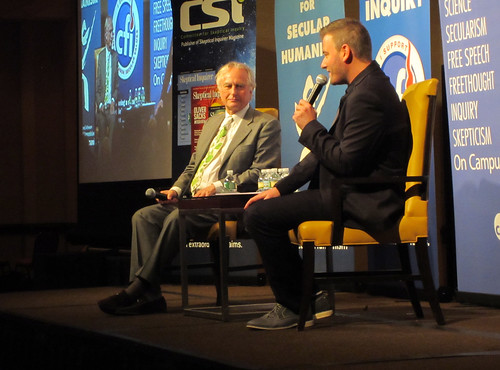 |
| Richard Dawkins (left), Josh Zepps, and about 60 tiny bottles of water. |
My primary takeaways: Like music, you don’t have to be able to
do science in order to appreciate and enjoy science, and “stick to your decent, liberal principles, and don’t compromise them.”
Which leads me to something else I want to say about the joy of cons. While no means the only (and maybe not even the biggest) draw, Dawkins was the superstar on the program. Given the opportunity, people queued for his autograph, and nervously stumbled over their questions during his Q&A. But once the spotlight had moved on to someone else, Dawkins, along with the majority of the weekend’s other speakers, became an attendee (and student and fan) along with the rest of us. He sat in front of me to hear
Ron Lindsay, and at least once came to someone else’s microphone for a Q&A. And significantly in his case, he was largely left alone. When Dawkins wasn’t ON, he was not being mobbed, or even pestered, because his draw isn’t about him. It’s about his ideas. At this convention, the ideas were unquestionably the real stars.
I ordered breakfast again on Sunday. My chatty room service waitress commented that I was treating myself with some eggs Benedict. She was absolutely right; I was headed home that day, and I knew damn well I wouldn’t be eating again for another 10–12 hours. She told me what a pleasure “[my] group” had been, and how it’s always uplifting to have a good event at her hotel. I thanked her warmly: always good to see seculars represented well. Sometimes it’s enough to be recognized as
not “evil.”
This time I skipped the skeptic track panel (CSI Executive Council Panel) in favor of the humanist track, “We Are Awake Already: Secular Humanists Reply to Sam Harris.” I had mixed feelings about the inclusion of this panel at all, as there’s far too much nitpicky infighting in the so-called atheism community.
Sam Harris has done great work in evangelizing secularism, so to speak, and an over-parsing of his recent
Waking Up: A Guide to Spirituality Without Religion seemed counterproductive (if not petty). But panelists
Judith Walker and Eddie Tabash made excellent points about “emotion in the service of reason.” Walker, in particular, spoke to Buddhism and what she called Buddhism Light getting an unreasonable free pass from critical inquiry, and how much secularized Buddhism (and Sam Harris) suffers from the dreaded “
deepities.” It’s possible—and for us, necessary—to separate “meaningful” from spiritual/religious. It does no service to secularism to cloak our very real and very significant life events in the language of religion. Calling an experience spiritual does not make that experience deeper.
Our final talk of the day was from outgoing president and CEO of CFI,
Ron Lindsay. In his 7 years at the helm, Lindsay has weathered some storms—what kind of activist would he be if he hadn’t?—and has done good things for CFI’s visibility. He insists he’s leaving the organization in good shape, while, “The mission of CFI is as vital as it ever was, maybe even more so.”
He also reflected on a common thread that ran through the humanist discussions: “It’s because our lives are finite that they have great significant. What we do matters because we do not get second chances.”
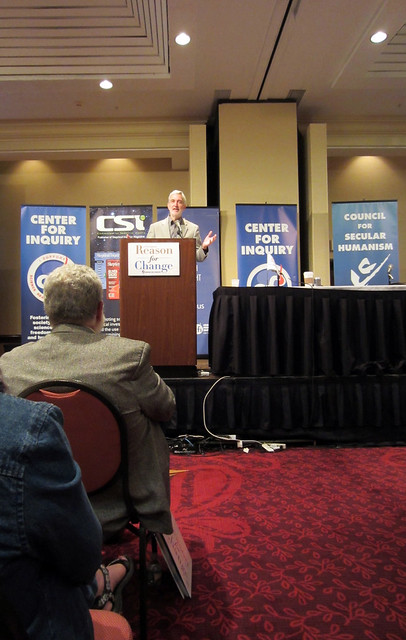 |
| Ron Lindsay, closing out the con. |
Lindsay was moved to tears as he spoke to the meaningful work CFI has done and will continue to do. For his efforts, he is given a long, and warm, standing ovation to end the conference.
After the official end of programming, attendees are invited for a tour of CFI HQ, which is right there in Amherst. Since I had my car, I drove through the
University at Buffalo campus and to the little CFI building, awkwardly nestled next to some hideous new construction. (Apartments, I think. I didn’t subject my sensibilities to the brutalism long enough to really register.) I arrived between tours and helped myself to a good meander through the building, until I heard the familiar voice of
Deb Goddard addressing people in the lobby.
I found her with 6 or 7 con-goers along with, oh look who it is again, Richard Dawkins, along for the tour. There was much respectful gawping and photo taking of
Paul Kurtz’s office, the collections of literal snake oil, bits and bobs and documentation significant to the freethinkers movement… and then we got to the middle of the building where we found the office and lab of Joe Nickell, featuring a real-live Joe Nickell.
Nickell, as I’ve mentioned, is a story-teller, an entertainer. His office is like a smaller version of what I expect my living room to look like in a few years, stuffed with skulls and voodoo fetishes, spirit cones and alien relics, shrunken heads and bigfootprint casts. Joe invited questions about any of his goodies, and told us tales of cases, like the elderly couple with a home that supposedly had “blood spurting out from the walls.” Since he’s an investigator and not a mystery-monger, Nickell brought forensics and good-ol’ rational observation to what appeared to be a sad case of some people needing attention (of one form or another).
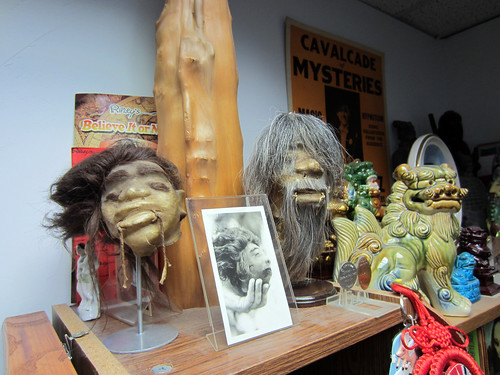 |
| Previous visitors to Joe Nickell's office. |
In a moment I can only describe as delightfully charming, Nickell presented Dawkins with one of his wooden nickels, which he gives out in lieu of business cards, running through the “magical properties” of the coin. The magic is, of course, simple but well-practice sleight of hand (it’s solid! it’s rubber! it’s two-headed! it’s vaaaaanishing!), which Joe decided to teach us, as a group. “Joe!” Debbie Goddard gasped. “I’ve known you for 15 years! You’ve never shown me!”
 |
| The ol' wooden nickel trick. |
Then came the part of the tour we’d all been looking forward to: the basement, where the real magic happens. That would be
the library and rare book room, which hold a certain kind of magic to a certain kind of person anyway. Deb handed us off to CFI librarian,
Tim Binga, who led us through the maze of shelving into the Holy of Holies, where he introduced us to the oldest item in the library, this 1699 edition of “
The Folly and Unreasonableness of Atheism.” He even let us touch it with our grubby little heathen hands. (It felt like history. And bigotry.)
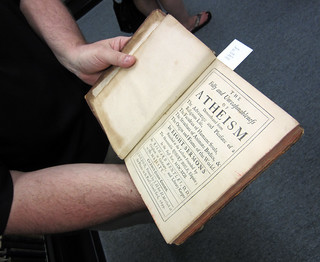 |
| 1699! Certainly the oldest book I've ever defiled. |
While at the back of the special collections, mostly donations from private libraries, Dawkins asked Binga, “Quite a big collection with finite space. How do you decide what to take in?”
“Well,” Tim began, “let’s say, you, for example, were interested in giving us your library. In that case… we’d build a wing.” The little group chuckled.
But Dawkins, not laughing, said, “How would we go about that? I mean, it’s quite large, my library.”
“Oh! Well, if that’s something you’d consider, it’s something we can certainly discuss at a time you find appropriate.”
“Yes, yes, I think I would.”
“I think we just witnessed a coup!” one of us said. “We’re witnesses!”
I’d given myself an extra day of vacation time to spend in Buffalo, Niagara, or wherever else in the region looked interesting. Unfortunately but unsurprisingly, by the time I left CFI, it was early evening, and my energy reserves were running low. But since I had to drive through Niagara to get home, I decided to at least stop at their little aquarium. Aquariums are pretty high up on my priority list in new cities, and this was a small one, so the time investment would be minor. Saw a
giant Pacific octopus (she was a beauty), some sea lions, bunch of…fish mostly. When I left, I noticed a number of people walking over a bridge, so I decided to see what was on the other side.
 |
| Great white shark of Aquarium of Niagara. |
What I found was an easy way to get into the
Niagara Falls State Park. The aquarium itself is across the freeway from the
Discovery Center, on the far side of the park, which is a trolley stop. Got my $3 trolley ticket, and let someone else drive my ass around for once. Obviously, I didn’t get the whole Niagara Falls experience, but I did get a good view of the American Rapids, and I did de-trolley long enough to walk down to
Horseshoe Falls. For someone with a fear of large bodies of water and vertigo—who can’t swim—that was enough experience at that moment.
I could see making a weekend of Niagara Falls, just not this weekend. I walked up to the hostess stand at the Top of the Falls Restaurant two minutes before they stopped seating, which meant I had the entire outdoor patio to myself. After stuffing myself full of “Buffalo mac and cheese” (mac and cheese with Buffalo chicken atop, pretty exotic), I could only hope I would retain consciousness for the drive home. (I did.)
Reason for Change was, overall, a mellow and pleasant weekend. With so many recent changes to contend with (CSI and the Council for Secular Humanism coming in-house, the departure of Ron Lindsay), I don't know if this smallish, local gathering represents CFI’s plan for future cons, or if this was just a good time for them to keep things close to home. I found the relative small size of the con a relief myself, as it makes getting familiar with new people that much easier. (There’s something to be said for four-figure attendance, but I’m not the one to say it.) As an opportunity for learning, it was stellar; as an occasion for all-important fellowship, even better.
At the end of programming on Sunday, Tom Flynn found me in the big room and teased, “I’m sure you're going to write a scathing piece about our little event.” As if I’ve ever written anything scathing in my life. What I have written is honest, which is a promise I always keep. But I do think I've failed in my other pledge—that this column would be more ruthlessly edited...or at least considerably shorter.
Sorry, Tom.














